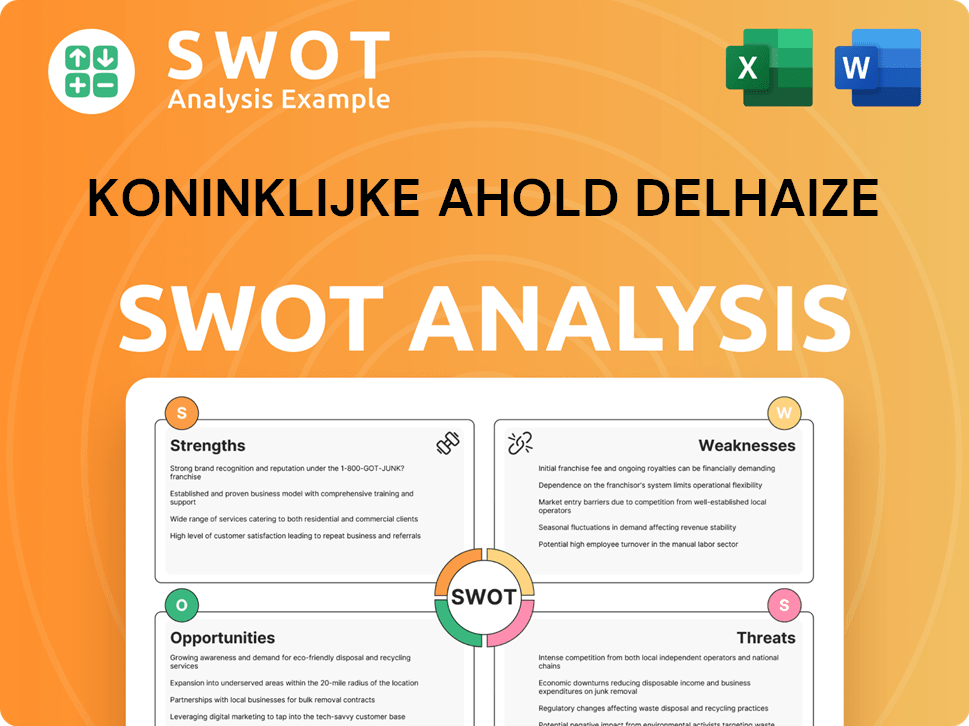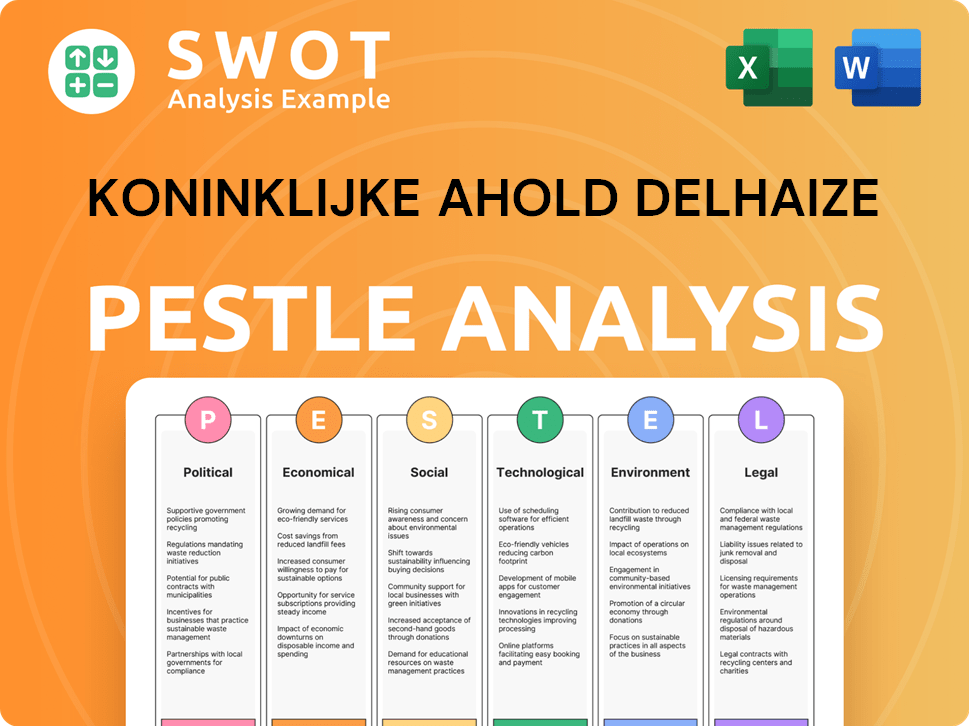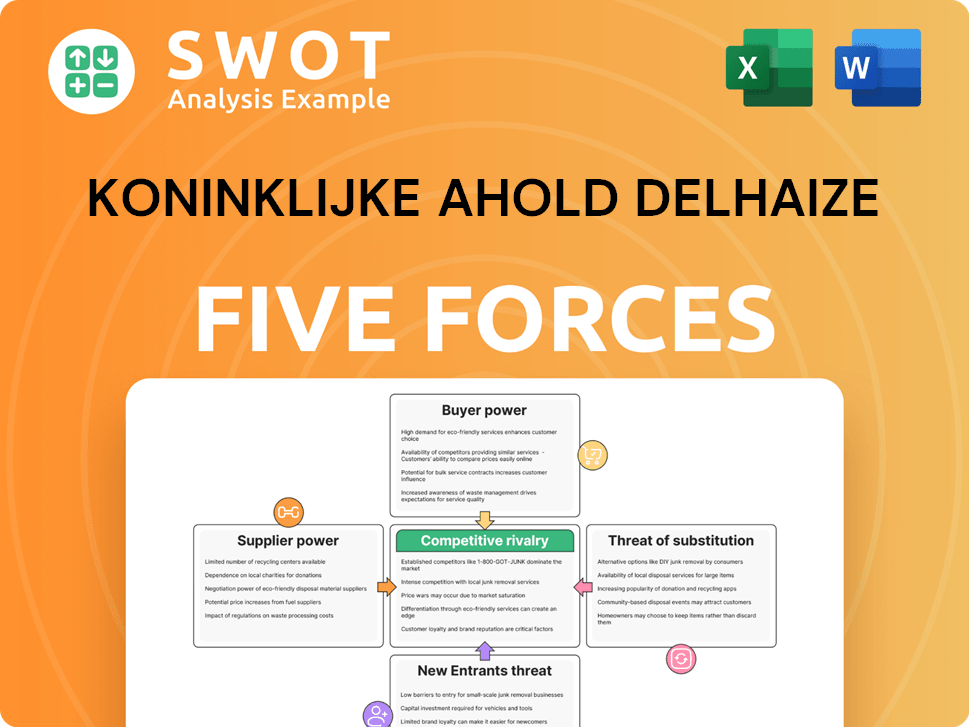Koninklijke Ahold Delhaize Bundle
How Does Koninklijke Ahold Delhaize Navigate the Grocery Retail Industry's Fierce Competition?
Koninklijke Ahold Delhaize, a titan in the global grocery retail industry, faces a constantly shifting Koninklijke Ahold Delhaize SWOT Analysis. With roots stretching back to the 19th century, this company has evolved into a major player in both supermarkets and e-commerce. But how does it maintain its edge in a market brimming with rivals and changing consumer preferences?

This exploration of the Ahold Delhaize competitive landscape will delve into its strategic initiatives, including its 'Growing Together' strategy, and dissect its financial performance against the backdrop of intense supermarket competition. We'll examine key aspects of Ahold Delhaize market analysis, including its competitors, market share, and how it's adapting to the evolving demands of the grocery retail industry. Ultimately, this analysis aims to provide actionable insights for understanding Ahold Delhaize's position and future growth strategies.
Where Does Koninklijke Ahold Delhaize’ Stand in the Current Market?
Koninklijke Ahold Delhaize holds a strong position in the global food retail industry. The company operates a vast network of supermarkets and e-commerce businesses, primarily in the United States and Europe. In 2024, the U.S. accounted for 60.6% of its net sales, while Europe contributed 39.3%.
Ahold Delhaize's core operations involve a wide range of grocery products, fresh produce, meat, bakery items, and household goods. The company is actively investing in digital transformation and diversifying its offerings to enhance its market position. Its omnichannel ecosystems are considered a major competitive advantage, boosting market share.
The company's value proposition includes providing a comprehensive selection of products through various store formats and online platforms. It focuses on customer satisfaction, operational efficiency, and sustainable practices. Ahold Delhaize aims to increase its private label offerings to 45% of total store sales by 2028, up from the current 38%.
In the U.S., Ahold Delhaize operates over 2,000 stores under brands like Food Lion, Stop & Shop, and Giant. These brands often hold a top-two position in their regional markets. Food Lion, for example, achieved its 49th consecutive quarter of comparable store growth in Q4 2024.
In Europe, Ahold Delhaize operates over 5,700 stores, with Albert Heijn in the Netherlands being a key asset. Albert Heijn controls over 37% of the Dutch market share and accounts for 55% of total European sales. This strong presence highlights the company's competitive edge.
Ahold Delhaize demonstrated solid financial results in 2024, with net sales reaching €89.4 billion. The underlying operating margin was 4.0%, meeting its strategic goals. The company generated a free cash flow exceeding €2.5 billion, surpassing its guidance, which helps in maintaining its competitive position.
Online sales grew by 5.8% in Q4 2024, driven by double-digit growth in online grocery, excluding the impact of the FreshDirect divestment. This focus on digital channels supports Ahold Delhaize's competitive strategy and enhances its market share. Further details can be found in Revenue Streams & Business Model of Koninklijke Ahold Delhaize.
Ahold Delhaize focuses on several key strategies to maintain its competitive edge. These include digital transformation, expansion of private label offerings, and strategic investments in store remodels and price competitiveness.
- Investing in omnichannel capabilities to meet evolving consumer preferences.
- Expanding private label brands to increase profitability and customer loyalty.
- Enhancing store formats to improve the shopping experience.
- Maintaining competitive pricing to attract and retain customers.
Koninklijke Ahold Delhaize SWOT Analysis
- Complete SWOT Breakdown
- Fully Customizable
- Editable in Excel & Word
- Professional Formatting
- Investor-Ready Format

Who Are the Main Competitors Challenging Koninklijke Ahold Delhaize?
The Ahold Delhaize competitive landscape is characterized by intense rivalry within the grocery retail industry, encompassing both traditional brick-and-mortar stores and the rapidly expanding e-commerce sector. This dynamic environment requires continuous adaptation to maintain market share and profitability. The company faces pressure from various competitors, including established supermarket chains and emerging online grocery platforms.
Ahold Delhaize market analysis reveals that the company must navigate a complex web of competitive forces. This includes price wars, technological advancements, and shifts in consumer behavior. The need for strategic agility is crucial as the company strives to maintain its position in a market that is constantly evolving.
The competitive pressures necessitate a deep understanding of rival strategies and market dynamics. The company's ability to innovate and adapt to the changing needs of consumers is critical to its long-term success.
Koninklijke Ahold Delhaize faces significant competition from major players in the grocery retail sector. These competitors challenge Ahold Delhaize across various fronts, including pricing, innovation, and market share.
Walmart is a major competitor, directly challenging Ahold Delhaize through its extensive product range and aggressive expansion in the online grocery market. Walmart's broad offerings and competitive pricing strategies put pressure on Ahold Delhaize's market share.
Kroger, with over 2,700 stores in the United States, is a direct competitor, particularly in the U.S. market. Kroger's investments in technology and digital initiatives pose a significant challenge to Ahold Delhaize's supermarket brands like Food Lion and Giant Food.
Tesco, a leading grocery and general merchandise retailer, competes with Ahold Delhaize across various product categories. Tesco's broad presence and competitive strategies impact Ahold Delhaize's market position.
Carrefour and Auchan Holding are notable competitors, particularly in the European market. These retailers challenge Ahold Delhaize's market share through their extensive store networks and competitive pricing.
Amazon poses a threat in the digital space, intensifying competition in online grocery shopping. Amazon's expansion and technological advancements require Ahold Delhaize to continually adapt and innovate.
Ahold Delhaize's competitive strategies include defending its market positions, such as Food Lion's focus on value, and securing market share gains. The company's 2016 merger provided synergies to combat competitive pressures. The Ahold Delhaize competitive landscape is also influenced by mergers and alliances. New players, particularly in online grocery, continuously disrupt the market, requiring ongoing adaptation and innovation. For a deeper dive into the company's strategies, consider reading more about Koninklijke Ahold Delhaize in this article: [Ahold Delhaize's Strategic Initiatives](0).
Ahold Delhaize faces challenges from competitors through various means, requiring it to implement effective strategies to maintain its market position. Price competition, innovation, and digital transformation are key areas of focus.
- Price Competition: Constant pressure in the retail industry leads to price wars and margin pressure.
- Innovation: Competitors vie for market share through innovation in products, branding, and technology.
- Digital Transformation: The shift to online grocery shopping, accelerated by the pandemic, has intensified competition in the digital space.
- Market Share Defense: Ahold Delhaize actively works to defend its positions, such as Food Lion competing with Walmart and local chains.
- Market Share Gains: The company has seen market share gains in key regions, including a 37.7% share for Albert Heijn in the Netherlands in Q4 2024.
Koninklijke Ahold Delhaize PESTLE Analysis
- Covers All 6 PESTLE Categories
- No Research Needed – Save Hours of Work
- Built by Experts, Trusted by Consultants
- Instant Download, Ready to Use
- 100% Editable, Fully Customizable

What Gives Koninklijke Ahold Delhaize a Competitive Edge Over Its Rivals?
Koninklijke Ahold Delhaize has established a strong position in the grocery retail industry by leveraging several key competitive advantages. These include a robust brand portfolio, extensive global presence, and a focus on digital innovation. The company's strategic moves and investments aim to maintain its competitive edge in a dynamic market.
The company's market analysis reveals a commitment to enhancing customer experiences through omnichannel strategies. This includes significant investments in e-commerce and digital platforms. These efforts are crucial for adapting to evolving consumer preferences and maintaining market share in a competitive landscape.
Ahold Delhaize's competitive strategies are designed to address the challenges of the supermarket competition. The company's approach focuses on local relevance, digital integration, and cost savings, ensuring sustained growth and profitability. The focus on own-brand assortments and sustainability initiatives further strengthens its market positioning.
Ahold Delhaize benefits from a diverse brand portfolio, including well-known names that foster high customer loyalty. These brands maintain a strong presence in their respective markets, contributing to the company's overall market share. This diversified approach reduces risk and allows for targeted strategies in different regions.
Operating in over 30 countries, Ahold Delhaize leverages its vast global presence to achieve economies of scale. This allows for favorable supplier agreements and efficient product distribution. This global reach is a key factor in its ability to compete effectively in the grocery retail industry.
Ahold Delhaize's omnichannel ecosystems are a major competitive advantage, contributing significantly to market share growth. The company has invested heavily in digital transformation, with its e-commerce and digital innovation arm, Peapod Digital Labs (PDL), playing a key role in developing seamless and personalized shopping experiences. Online sales increased by 13.7% in Q1 2025.
The company is focused on expanding its own-brand assortments, which offer competitive pricing and unique product formulations. This strategy aims to increase private label penetration to 45% of total food sales by 2028. Continuous investment in technology, including AI and automation, enhances operational efficiency.
Ahold Delhaize's competitive landscape is shaped by its strong brand portfolio, global presence, and focus on digital transformation. These elements contribute to its ability to compete effectively in the grocery retail industry. The company's strategic investments and innovations are designed to sustain its competitive edge.
- Strong Brand Portfolio: Includes trusted brands like Albert Heijn, Delhaize, Food Lion, and Stop & Shop.
- Global Presence: Operations in over 30 countries, allowing for economies of scale.
- Omnichannel Ecosystems: Investments in e-commerce and digital platforms, including Peapod Digital Labs (PDL).
- Own-Brand Focus: Expanding own-brand assortments to offer competitive pricing and unique products. For more information, see Growth Strategy of Koninklijke Ahold Delhaize.
Koninklijke Ahold Delhaize Business Model Canvas
- Complete 9-Block Business Model Canvas
- Effortlessly Communicate Your Business Strategy
- Investor-Ready BMC Format
- 100% Editable and Customizable
- Clear and Structured Layout

What Industry Trends Are Reshaping Koninklijke Ahold Delhaize’s Competitive Landscape?
The food retail industry is experiencing significant shifts, creating both challenges and opportunities for companies like Koninklijke Ahold Delhaize. The competitive landscape for Ahold Delhaize is shaped by technological advancements, evolving consumer preferences, and regulatory changes. Understanding these dynamics is crucial for assessing the company's market position and future prospects. For more insights, consider reading about the Growth Strategy of Koninklijke Ahold Delhaize.
Ahold Delhaize faces intense competition from both traditional and online retailers, impacting market share and margins. Consumer price sensitivity, especially in an inflationary environment, adds to the pressure. However, the company is actively adapting through strategic initiatives, including expansions in e-commerce and investments in its omnichannel offerings to maintain a competitive edge in the grocery retail industry.
Key trends include the rise of e-commerce, AI-driven personalization, and demand for seamless omnichannel experiences. Consumers are increasingly focused on health, sustainability, and convenient shopping options. Regulatory changes and global economic shifts, such as inflation and supply chain disruptions, also play a crucial role in shaping the market.
Ahold Delhaize faces challenges from intense competition, potentially eroding market share and margins. Changing consumer preferences and price sensitivity, especially in an inflationary environment, pose threats. The cessation of tobacco sales in the Netherlands and addressing methane emissions in its supply chain are also significant hurdles.
The shift towards online grocery shopping presents an opportunity for Ahold Delhaize to expand its e-commerce capabilities. The 'Growing Together' strategy, launched in 2024, supports accelerating growth and strengthening omnichannel offerings. The company plans to invest significantly in price investments and expand affordable own-brand product ranges.
Ahold Delhaize plans to accelerate new store openings and remodels, with 12 new supermarkets planned across its U.S. banners in 2025. The company is focused on integrating new acquisitions, such as Profi in Romania. Innovation and technology, including retail media, are key drivers for future growth.
Ahold Delhaize aims to maintain an underlying operating margin of around 4%. The company targets mid to high single-digit EPS growth in 2025. Retail media revenue is projected to reach approximately €3 billion by 2028.
- Investment of €1 billion in price investments in the U.S. over the next four years.
- Expansion of affordable own-brand product ranges.
- 12 new supermarkets planned across U.S. banners in 2025.
- Profi acquisition in Romania adding over 1,700 stores.
Koninklijke Ahold Delhaize Porter's Five Forces Analysis
- Covers All 5 Competitive Forces in Detail
- Structured for Consultants, Students, and Founders
- 100% Editable in Microsoft Word & Excel
- Instant Digital Download – Use Immediately
- Compatible with Mac & PC – Fully Unlocked

Related Blogs
- What are Mission Vision & Core Values of Koninklijke Ahold Delhaize Company?
- What is Growth Strategy and Future Prospects of Koninklijke Ahold Delhaize Company?
- How Does Koninklijke Ahold Delhaize Company Work?
- What is Sales and Marketing Strategy of Koninklijke Ahold Delhaize Company?
- What is Brief History of Koninklijke Ahold Delhaize Company?
- Who Owns Koninklijke Ahold Delhaize Company?
- What is Customer Demographics and Target Market of Koninklijke Ahold Delhaize Company?
Disclaimer
All information, articles, and product details provided on this website are for general informational and educational purposes only. We do not claim any ownership over, nor do we intend to infringe upon, any trademarks, copyrights, logos, brand names, or other intellectual property mentioned or depicted on this site. Such intellectual property remains the property of its respective owners, and any references here are made solely for identification or informational purposes, without implying any affiliation, endorsement, or partnership.
We make no representations or warranties, express or implied, regarding the accuracy, completeness, or suitability of any content or products presented. Nothing on this website should be construed as legal, tax, investment, financial, medical, or other professional advice. In addition, no part of this site—including articles or product references—constitutes a solicitation, recommendation, endorsement, advertisement, or offer to buy or sell any securities, franchises, or other financial instruments, particularly in jurisdictions where such activity would be unlawful.
All content is of a general nature and may not address the specific circumstances of any individual or entity. It is not a substitute for professional advice or services. Any actions you take based on the information provided here are strictly at your own risk. You accept full responsibility for any decisions or outcomes arising from your use of this website and agree to release us from any liability in connection with your use of, or reliance upon, the content or products found herein.